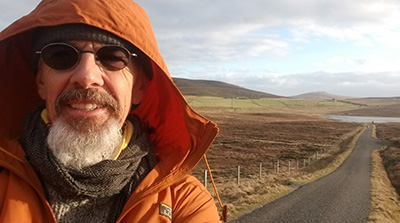Stuart C. Aitken
 Professor Emeritus of Geography, June Burnett Chair (on FERP)
Professor Emeritus of Geography, June Burnett Chair (on FERP)
Storm Hall 302B | [email protected]
Curriculum Vitae
Stuart C. Aitken is June Burnett Chair and Distinguished Professor of Geography at San Diego State University. He is the founding director of the research center Youth, Environment, Society and Space (YESS). Stuart’s research interests include critical social theory, qualitative methods, film, children, families and communities. He has published 14 books and over 200 articles in academic journals as well as in various edited book collections and encyclopedias. Stuart is past co-editor of The Professional Geographer and Children’s Geographies. He has worked with the United Nations on child rights, labor and migration issues. Stuart’s research on children a youth encompasses work in Norway, Brazil, China, Chile, Ethiopia, Slovenia and Romania, as well as the USA, Canada and Scotland. He is active in the American Association of Geographers, the Association of Pacific Coast Geographers and the Institute of British Geographers. Stuart has held honorary professorships at Simon Fraser University, Vancouver, Canada and the University of Wales, Aberystwth. He is an elected member of the Royal Norwegian Society for Science and Letters learned society. Stuart offers geo-philosophy, children’s right and youth activism graduate seminars, and at the undergraduate level regularly teaches ‘People, Places and Environment’ (GEOG 102), ‘Qualitative Methods in Geography’ (GEOG 586), and ‘The Geography of Cities’ (GEOG 354).
- Ph.D., The University of Western Ontario, London, Canada, 1985
- M.A., Miami University, Oxford, Ohio, USA. 1981
- B.Sc., University of Glasgow, Scotland, UK, 1980
- GEOG 102: People, Places, and Environments
- GEOG 354: The Geographies of Cities
- GEOG 586: Qualitative Methods in Geographic Research
- Substantive areas of research in urban and social geography with an emphasis on (i) families and communities, (ii) children and youth, and (iii) film
- Critical analysis of visual representations and Geographic Information Systems with a focus on how they are used in planning and teaching
- Qualitative and poststructural methods in geography
- Emphasis on feminist and critical theory
- The History of Geographic Thought